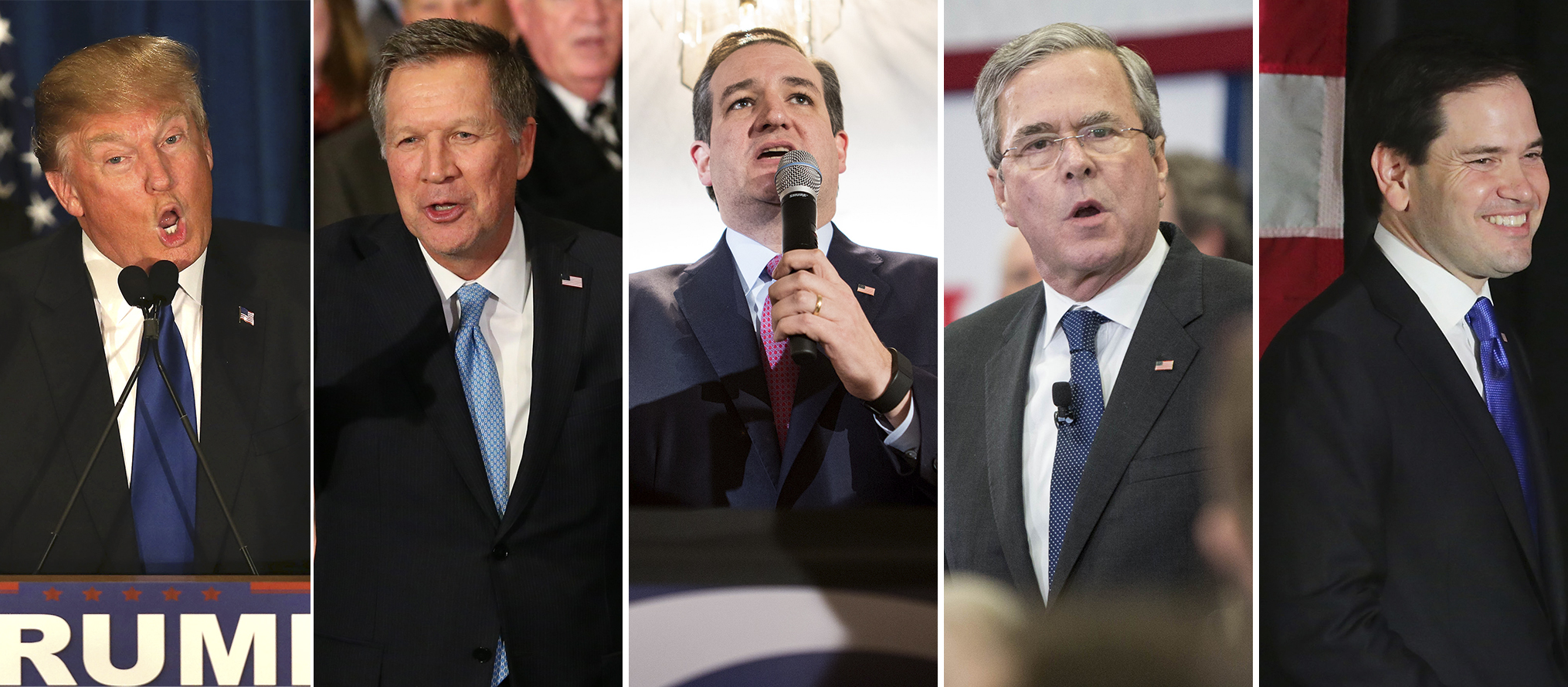The GOP race is as crazy and wide open as it's ever been
Anyone could win. Even Donald Trump. Even Jeb Bush!


After the results in Iowa, I crowed about how I called it. Now that the New Hampshire results are in, I have to own the fact that I faceplanted. I predicted that Donald Trump would underperform and that Marco Rubio would overperform (and win, even!). After Trump's dominating victory, and Rubio's meek fifth-place finish, I must admit that I was totally wrong. Fair is fair.
Where did I go wrong? By putting my faith in momentum.
The idea that candidates accumulate or lose this thing called momentum based on how they perform relative to expectations in a primary, while sometimes true (remember Bill Clinton in 1992?) is also not an iron law of politics, and perhaps less so now than at any time, when the media world is so fragmented. Back when there were only three networks, and all three were saying that So-and-So is outperforming expectations and gaining momentum, it became a self-fulfilling prophecy. Voters only had so many places to turn for information and analysis, and whatever the media Powers That Be declared as truth often came to be. But today, with hundreds of news organizations covering the election in their own way, neither the fragmented media nor voters themselves need to buy the momentum premise and feed it.
Subscribe to The Week
Escape your echo chamber. Get the facts behind the news, plus analysis from multiple perspectives.

Sign up for The Week's Free Newsletters
From our morning news briefing to a weekly Good News Newsletter, get the best of The Week delivered directly to your inbox.
From our morning news briefing to a weekly Good News Newsletter, get the best of The Week delivered directly to your inbox.
And in hindsight, is it really so hard to see how even after losing his momentum in Iowa, Trump's message would still appeal to New Hampshire voters? After all, this is a state that rewarded the working-class populism of Pat Buchanan in 1992 and 1996. The state has lost more manufacturing jobs to trade than any other state, and its now infamous heroin epidemic must reinforce the general impression of a societal malaise and decline that calls for a strongman who can, well, Make America Great Again.
As for Rubio, well... that debate failure really, really mattered. I have high regard for Rubio, who I think understands the political challenges facing the GOP better than any other candidate in the race, who has actually shown depth on the issues, and with whom I agree on most issues (though certainly not all). After his faceplant, I downplayed it. People only tuned in during the second half of the debate! They're not going to pay attention to the debate replays because of the Super Bowl! Actual voters didn't see it the way the chattering class did!
In hindsight, I must concede that it's not that I thought it wouldn't have an impact, it's that I didn't want it to have an impact.
So, what to make of the results now? My support for Rubio notwithstanding, it's pretty much the worst possible outcome for the GOP. As a card-carrying member of the anybody-but-Trump, anybody-but-Cruz crowd, the hope for the New Hampshire primary was to solidify the non-Trump, non-Cruz vote (which happens to be the biggest slice of the vote) by kicking out most of the half dozen candidates running for that vote. Instead, it did exactly the opposite.
New Hampshire elevated John Kasich and Jeb Bush. Kasich seems like an honorable man and a talented administrator, but he's almost certainly too moderate to win in the primary and too uncharismatic to win in the general. His second-place finish, by boosting his campaign, only hurts the GOP by encouraging him to stick around and take votes from the others.
And as for Bush, his heart just isn't in it, which means he's likely not going to win anything. And he's a Bush, which means putting him as the face of the party in a change election, at a time when the GOP needs to change, would be a disaster. Like Kasich, the only thing he can do with his new lease on life is to hurt the party.
And yet... the race is as wide open as it's ever been. Cruz is doing very well and has a plausible path to the nomination. Bush has a plausible path to the nomination if Rubio keeps foundering and Bush can consolidate the establishment vote. Rubio has a plausible path to the nomination if he bounces back. Even Trump has a plausible path to the nomination, now that he's shown he can win primaries and has scattered his opponents who, inexplicably, still fail to attack him in any meaningful way.
Iowa and New Hampshire are supposed to winnow the field. Instead, they have blown it wide open. The 2016 Republican presidential nomination is as up for grabs as it's ever been.
A free daily email with the biggest news stories of the day – and the best features from TheWeek.com
Pascal-Emmanuel Gobry is a writer and fellow at the Ethics and Public Policy Center. His writing has appeared at Forbes, The Atlantic, First Things, Commentary Magazine, The Daily Beast, The Federalist, Quartz, and other places. He lives in Paris with his beloved wife and daughter.
-
 The best shows to see at Edinburgh Fringe 2025
The best shows to see at Edinburgh Fringe 2025The Week Recommends The world's biggest arts festival is back with an incredible line-up
-
 Wonsan-Kalma: North Korea's new 'mammoth' beach resort
Wonsan-Kalma: North Korea's new 'mammoth' beach resortUnder the Radar Pyongyang wants to boost tourism but there won't be many foreign visitors to Kim Jong Un's 'pet project'
-
 The 5 best TV reboots of all time
The 5 best TV reboots of all timeThe Week Recommends Finding an entirely new cast to play beloved characters is harder than it looks
-
 The last words and final moments of 40 presidents
The last words and final moments of 40 presidentsThe Explainer Some are eloquent quotes worthy of the holders of the highest office in the nation, and others... aren't
-
 The JFK files: the truth at last?
The JFK files: the truth at last?In The Spotlight More than 64,000 previously classified documents relating the 1963 assassination of John F. Kennedy have been released by the Trump administration
-
 'Seriously, not literally': how should the world take Donald Trump?
'Seriously, not literally': how should the world take Donald Trump?Today's big question White House rhetoric and reality look likely to become increasingly blurred
-
 Will Trump's 'madman' strategy pay off?
Will Trump's 'madman' strategy pay off?Today's Big Question Incoming US president likes to seem unpredictable but, this time round, world leaders could be wise to his playbook
-
 Democrats vs. Republicans: which party are the billionaires backing?
Democrats vs. Republicans: which party are the billionaires backing?The Explainer Younger tech titans join 'boys' club throwing money and support' behind President Trump, while older plutocrats quietly rebuke new administration
-
 US election: where things stand with one week to go
US election: where things stand with one week to goThe Explainer Harris' lead in the polls has been narrowing in Trump's favour, but her campaign remains 'cautiously optimistic'
-
 Is Trump okay?
Is Trump okay?Today's Big Question Former president's mental fitness and alleged cognitive decline firmly back in the spotlight after 'bizarre' town hall event
-
 The life and times of Kamala Harris
The life and times of Kamala HarrisThe Explainer The vice-president is narrowly leading the race to become the next US president. How did she get to where she is now?
